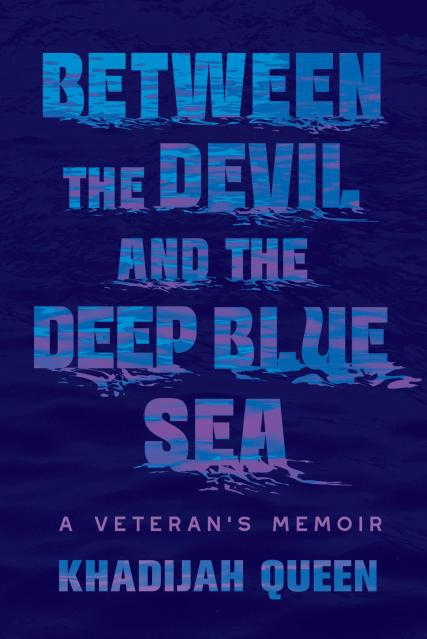Happy Friday, friends. We made it. Today, I have a great writing prompt for you all from guest author, memoirist Khadijah Queen, whose latest book is Between the Devil and the Deep Blue Sea, about her time spent in the U.S. Navy, where she was faced with near-constant sexual harassment, demeaning labor assignments, and overt racism. Hanif Abdurraqib called the book “richly populated” and “a gift.”
Paid subscribers to the newsletter get full access to prompts like these, to our Reading Group, and more, along with 20% off my podcast Dire Straights, where we are kicking off a series on masculinity next week. Mad Woman subscriptions are currently on sale, so join us.

Our guest author
Khadijah Queen’s writing truly spans genres: She is the author of a book of criticism, Radical Poetics: Essays on Literature & Culture, she co-edited Infinite Constellations, an anthology of speculative writing by authors from the global majority, and her most recent poetry book is Anodyne (Tin House 2020), was a finalist for the Colorado Book Award and winner of the William Carlos Williams Award from the Poetry Society of America. Her book, I’m So Fine: A List of Famous Men & What I Had On (YesYes Books 2017), was praised in O Magazine, The New Yorker, Rain Taxi, and elsewhere as “quietly devastating” and “a portrait of defiance that turns the male gaze inside out.” Her verse play Non-Sequitur (Litmus Press 2015) won the Leslie Scalapino Award for Innovative Women’s Performance Writing.
In 2022, she was awarded a Disability Futures fellowship from United States Artists, and she is a Cave Canem alum. Khadijah holds a PhD in English and Literary Arts from University of Denver, and is currently writing a new book of poetry and a collection of travel essays. You can subscribe to her Substack or find her on BlueSky.
Khadijah Queen on persistence, patience, and the very unsexy (and unavoidable) art of writing memoir
From the time I drafted the first 80 pages in grad school, fresh out of my service in the Navy and feeling rather miserable about the experience, it took two decades for me to publish my memoir. The more I wrote in that first draft, the more it felt like a purge. The things I saw in no way fit the common public narrative about military service—heroics, blood and guts, excitement.
No, my experience looked more like maddening double standards, sexual harassment, and grueling workdays that allowed for very little rest or sleep. Who wanted to readabout that? I de-prioritized it as a project, though I collected little fragments here and there, scrawling down memories in notebooks, especially when people asked me about my time as a sonar technician in the 1990s and that triggered something.
I also published several other books—mostly poetry, but also criticism and an absurdist verse play—but the memoir kept haunting me. Once I had a few notebooks stacked up, I thought I’d better start paying some attention. I returned to it in 2016 during my PhD studies, and by November 2019 I finished a 250-page draft.
Then the pandemic interrupted that momentum. Family obligations, work, and health demands stretched me quite thin. But hearing news of the killing of 20-year-old soldier Vanessa Guillén on that Texas army base in 2020 gave me a feeling of greater urgency to talk about what it was like to be a woman in the military. Persistence and patience had gotten me through my service, and I needed both to go through the revision, editing, and publishing process as well. There aren’t enough stories told by women veterans. In fact, we don’t often picture veterans as soldiers, sailors, marines, etc. Yet we’ve always been there. Which brings me to the writing prompt.
There aren’t enough writing prompts about joy
Writing intensively about a traumatic experience is taxing. I had to learn to take care of myself during the process. And, to counter the emotional difficulty, I found that had to include something enjoyable about my story, too. But how to avoid being mired in trauma the whole time?
A wise person (probably a therapist) once told me to turn a complaint into a request. So I did what nerdy people do for fun: research. I wanted a way into the memoir and into history—another thing I love—that could connect my experience to that of other women. And I used humor, too, but what gave me the most delight was traveling to London and Greenwich, looking at primary sources in the archives, reading first-person 18th century narratives, absorbing all the stories—hidden and otherwise—about women around the world who were sailors, military leaders, merchants, and pirates over the centuries. That choice changed the experience for me and, I hope, added an important layer of context for the reader.
Prompt: Finding “atypical delight”


